Labour Party (Malta)
Labour Party Partit Laburista | |
|---|---|
.jpg) | |
| Abbreviation | PL |
| Leader | Joseph Muscat |
| Headquarters | Ħamrun |
| Newspaper | Kullhadd |
| Ideology |
Social democracy[1][2] Pro-Europeanism |
| Political position | Centre-left to Left-wing |
| European affiliation | Party of European Socialists |
| International affiliation | None[3] |
| European Parliament group | Progressive Alliance of Socialists and Democrats |
| Colours | Red |
| Parliament of Malta |
37 / 67 |
| European Parliament |
3 / 6 |
| Local Council Seats |
245 / 455 |
| Website | |
|
partitlaburista | |
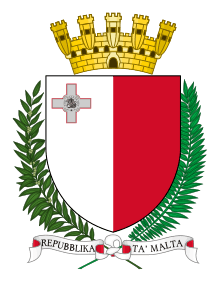 |
|---|
| This article is part of a series on the politics and government of Malta |
|
Republic |
|
|
| Foreign relations |
The Labour Party (Maltese: Partit Laburista, PL), formerly known as the Malta Labour Party (MLP), is a social-democratic[1][2] political party in Malta. Along with the Nationalist Party (PN), the Labour Party is one of two major contemporary political parties in Malta. Since the March 2013 general election, the party has been the governing party in the Maltese House of Representatives.[4] The Labour Party is a member of the Party of European Socialists,[5] and was a member of the Socialist International until December 2014.[3]
Party structure
The Party structures are the General Conference, the National Executive, the Leader and the Deputy Leaders, the Party Congress, the Party Administration, the Parliamentary Group, the Councillors' Section, the District and the Regional Administrations, the Local Committees and the Branches.[6]
The General Conference is largely made up of delegates from the Party's other constituent structures and is the Party's highest organ. The National Executive brings together the Party Administration as well as elected representatives of other constituent structures and co-ordinators. The Party Congress is made up of all members of the Party and elects the Leader and the two Deputy Leaders (one for Party, the other for Parliamentary affairs) and determines the Party's broad policy outlines. The Party Administration is made of the Party Leader, Deputy Leaders and Party officials. The Parliamentary Group and the Councillors' Section bring together the Party's elected representatives in parliament and local councils. The Party is organised geographically in the local committees (smallest) and district and regional (largest) administrations. Finally, the Branches of the Party include the women's, youth, senior and candidates' sections.
Media holdings
Although not formally part of the Party's structures, the PL owns a number of media and communication outlets. The party directly owns the Sunday weekly newspaper Kullħadd and through its holding company One Productions the party owns the television station One and radio service One Radio.[7]
History
Foundation, first years and first government (1921–1949)
The Labour Party was founded as the Chamber of Labour (Italian: Camera del Lavoro) in 1921 by one of the union branches affiliated with the Imperial Government Workers Union. Band clubs and other organisations were invited to send delegates to the Party's founding meeting on 15 March 1921, significantly, the 30th anniversary of Pope Leo XIII's Rerum novarum.[8]
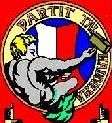
Led by Colonel William Savona, the Party contested the general elections held in 1921 and 1924 under the new Constitution that gave the country a measure of self-government. The Labour-Constitutional alliance won the 1927 general elections, but Labour lost ground, gaining 13.9% of votes, three seats in the Legislative Assembly and no representation in the Senate. Strickland became Prime Minister. Labour leader Savona was not elected, and the leadership of the Labour parliamentary group was temporarily entrusted to Colonel Michael Dundon. The Presidency of the Party and leadership of the parliamentary group was taken up by Paul Boffa later that year.
Labour gained nine seats out of ten in the elections held during November, 1945, in which, contrarily to previous elections, all men over twenty-one years of age were entitled to vote. The Party's electoral programme, for the first time in Labour's history, did not make any reference to religion. Boffa's Government was supported by the General Workers' Union, and it carried out a number of reforms, such as the abolition of the Senate, the abolition of plural votes, as well as the introduction of women's right to vote. However, Labour deputies resigned from their posts in July 1946 due to mass redundancies at the Dockyards. In the meantime, the 'MacMichael Constitution' had been introduced, granting self-government to the Maltese. Labour's participation in the subsequent October, 1947 elections was once again supported by the General Workers' Union. The Party won 59.9% of the vote and twenty-four seats out of the possible forty within the Legislative Assembly. Paul Boffa became Prime Minister whilst Dom Mintoff became Deputy Prime Minister and Minister for Reconstruction. The Labour Government introduced Income Tax and Social Services for the first time in Malta.
Re-founding and return to government (1949–1958)
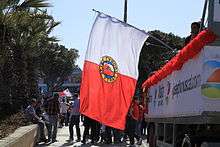
The Labour Party was re-founded in 1949 as a successor to the Labour Party founded in 1921. Paul Boffa, Leader of the Labour Party and Prime Minister since 1947, resigned and left the party because of serious disagreements with his Deputy Dom Mintoff which had led to a series of cabinet crises. Boffa formed the Malta Workers Party (MWP) while Mintoff re-organized the Labour Party as the Malta Labour Party.
The Malta Labour Party contested its first elections for the Malta Legislative Assembly the following year. The old Labour vote was split equally between the MLP and the MWP, giving them eleven members each. This allowed the Nationalist Party (PN) to have a slight edge in the formation of a government, which it did in coalition with the MWP. The government did not last long. Two other elections were held in 1951 and 1953 (the last time a coalition governed in Malta) which both saw short-lived PN-MWP coalitions and the decline in the share of votes to the MWP with increasing support for the Labour Party.
The MWP eventually disintegrated and the MLP formed a government for the first time in 1955. This legislature was dominated by the issue of integration with the United Kingdom. The party, which started its life as an anti-colonial party with the slogan "Integration or self-determination" was now inclined towards the first part of the formula. A referendum was held in 1956 but given the number of abstentions and massive opposition by the Nationalist Party and the Catholic Church, the result was inconclusive. This, together with a number of dismissals at the naval dockyard led to Mintoff's resignation and his call for massive protests in April 1958.
Opposition (1958-71)
The Governor re-established direct colonial government which lasted until 1962. In the meantime, the Malta Labour Party's connections with Third World Independentist and Socialist movements set it on a collision course with the Maltese Catholic Church, which the Party perceived as being pro-British and the cause of the failure of the Integration project. This led to the party leadership being interdicted from 1961 to 1964, when reading, advertising and distributing Party newspapers was deemed a mortal sin. In the 1962 elections this led to the defeat of the Party at the polls as well as a split with the creation of the Christian Workers' Party. Peace with the Church would not be made until 1969 by which time the Christian Workers' Party had disintegrated.
The MLP participated in independence talks but disagreed with what was offered, causing them to not participate in the Independence celebrations when independence was actually achieved in 1964. The party made strong gains in the 1966 elections which, however, were not enough to see it in office.
An unimportant split occurred in 1969 when the Communist Party of Malta was founded. This split happened as a result of the truce between the Malta Labour Party and local Catholic authorities. The Communist Party has since only contested the 1987 elections.
The post-Independence Mintoff governments (1971-84)
Labour won the 1971 general election and immediately set out to re-negotiate the post-Independence military and financial agreements with the United Kingdom. The government also undertook socialist-style nationalization programmes, import substitution schemes, and the expansion of the public sector and the welfare state. Employment laws were revised with gender equality being introduced in salary pay. In the case of civil law, civil (non-religious) marriage was introduced and homosexuality and adultery were decriminalised. Through a package of constitutional reforms agreed to with the opposition party, Malta became a republic in 1974.
The Labour Party was confirmed in office in the 1976 elections. In 1981 the Party managed to hold on to a parliamentary majority, even though the opposition Nationalist Party managed an absolute majority of more than 4000 votes. A serious political crisis ensued when Nationalist MPs refused to accept the electoral result and also refused to take their seats in parliament for the first years of the legislature. Premier Dom Mintoff called this action "perverse" but it was not an uncommon one in any parliamentary democracy with disputed election results. He proposed to his parliamentary group that fresh elections be held, but most members of his Parliamentary group rejected his proposal. Mintoff, who had been considering vacating the party leadership position even before the elections, voluntarily resigned as Prime Minister and Party leader in 1984 (although he retained his parliamentary seat). A Party General Conference in that same year appointed Karmenu Mifsud Bonnici who acted uncontested as party leader.
The post-Mintoff era (1984–92)
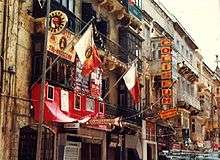
The Mifsud Bonnici years were characterised by political tensions and violence. The deadlock was broken when constitutional amendments were made voted and made effective in January 1987 which guaranteed that the party with an absolute majority of votes would be given a majority of parliamentary seats in order to govern. This paved the way for the return of the Nationalist Party to government later that year.
The Labour party performed very badly in the following election in 1992, losing by nearly 13,000 votes. Mifsud Bonnici resigned due to deteriorating health and on 26 March Labour elected Alfred Sant as the new leader.
Sant leadership and Modernisation (1992-2008)
Sant who won the election for party leader, and then modernized the party, secured a victory at the polls in 1996. Under Sant's leadership the party made several changes. The party opened the new Labour Party Headquarters in Hamrun instead of the old Macina in Cottonera. The party also made giant steps in the media by being the first Maltese political party to own its radio and television stations.
Sant managed to win comfortably the 1996 elections held on 26 October by over 8,000 votes on the Nationalist Party. The 1987 constitutional amendments, which secured the necessary additional seats, had to be used for the second time, having been used for the same time in 1987. This same amendment had to be used a third time in 2008.
However, trouble was brewing. Mintoff, for reasons known to him alone (within the MLP), started creating problems in Parliament for the one seat Labour parliamentary majority. In summer of 1998 Labour lost a division vote on the proposed Cottonera waterfront project because of Mintoff's renegation on his parliamentary group. This was considered by the Prime Minister Sant as a vote of no confidence in his government and informed the then President of the Republic that he no longer held the parliamentary majority. The President had on various occasions asked Prime Minister Alfred Sant to try to find a solution for the political crisis created, but when all attempts proved futile, had no other option but to accept Sant and his government's resignation and a call for early elections, which were held on 5 September 1998. Labour Party was defeated with a wide 13,000 vote margin.
Back in opposition, the party campaigned unsuccessfully against EU membership, and the 'NO' camp lost the referendum for the ascension of Malta in the European Union on 8 March (although Sant claimed victory) and was again defeated in the general election a month on, on 14 April 2003 once more with a 12,000 vote margin. Sant resigned but stood again for election of Leadership of the Party where he was voted again as leader with more than 65% of the votes.
In June 2004 the party succeeded in obtaining a relative majority of votes in the elections held to elect the first five Maltese MEPs for the European Parliament.[9] The party elected 3 of his candidates: Joseph Muscat (later replaced by Glenn Bedingfield), John Attard Montalto and Louis Grech.
In 2008 the Labour Party lost for the third consecutive time in the 2008 general elections, obtaining 48.79% share of the vote[10] and losing the election to the Nationalist Party by just 1,580 votes or 0.5%. Following the loss of the election, Sant resigned as Labour Party leader on 10 March 2008.
During Muscat Leadership (post-2008)
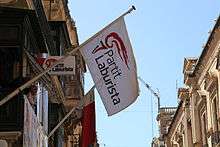
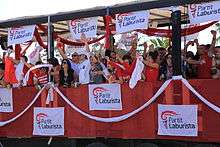
The first round of the election of the new leader were held on 5 June 2008. Five members contested this election as candidates: George Abela (a former Deputy Leader), Evarist Bartolo (a frontbench MP and ex-Minister), Marie Louise Coleiro Preca (a frontbench MP and former Secretary-General of the Party), Michael Falzon (an MP and Deputy Leader of the Party) and Joseph Muscat (an MEP). In the first round neither candidate obtained 50%+1 the majority of the votes. So a run up election had to be held on 6 June between the top two candidates who obtained the most number of votes, George Abela and Joseph Muscat. Muscat was elected Labour Party leader, gathering 66.36% of the total votes. He was co-opted in Parliament and appointed Leader of the Opposition on 1 October.
During an Extraordinary General Conference, held in November 2008, it was decided that the party's official name will be Partit Laburista instead of its former name Malta Labour Party. The previous emblem was changed although the symbol of the torch was retained.
In June 2009 the party garnered 55 percent of the first preference votes in the election for the European Parliament, electing 3 MEPs who sit with the Progressive Alliance of Socialists and Democrats. This result led to Labour a fourth MEP when the Treaty of Lisbon came into effect and the number of seats allocated to Malta increased from five to six.
Muscat managed to win comfortably the 2013 elections held on 9 March by over 35,000 votes on the Nationalist Party. The Labour Party won a massive 55% of the votes.
In the 2014 MEP elections, the Labour Party retained a majority of 34,000 votes (53%), but lost its fourth seat to the Nationalist Party (Malta) candidate Therese Comodini Cachia.
In 2017, Joseph Muscat was re-elected during the general election with Labour demonstrating a clear landslide victory for the second consecutive time, merely an hour after the vote counting commenced.
Electoral performance
General elections
| Election | Leader | Votes | % | Seats | +/– | Position | Government |
|---|---|---|---|---|---|---|---|
| 1921 | William Savona | 4,742 | 23.2 | 7 / 32 |
Opposition | ||
| 1924 | William Savona | 4,632 | 19.2 | 7 / 32 |
Opposition | ||
| 1927 | William Savona | 5,011 | 14.5 | 3 / 32 |
Coalition | ||
| 1932 | Paul Boffa | 4,138 | 8.6 | 1 / 32 |
Opposition | ||
| 1939 | Paul Boffa | 3,100 | 8.8 | 1 / 10 |
Opposition | ||
| 1945 | Paul Boffa | 19,071 | 76.2 | 9 / 10 |
Majority | ||
| 1947 | Paul Boffa | 63,145 | 59.9 | 24 / 40 |
Majority | ||
| 1950 | Dom Mintoff | 30,332 | 28.6 | 11 / 40 |
Opposition | ||
| 1951 | Dom Mintoff | 40,208 | 35.7 | 14 / 40 |
Opposition | ||
| 1953 | Dom Mintoff | 52,771 | 44.6 | 19 / 40 |
Opposition | ||
| 1955 | Dom Mintoff | 68,447 | 56.7 | 23 / 40 |
Majority | ||
| 1962 | Dom Mintoff | 50,974 | 33.8 | 16 / 50 |
Opposition | ||
| 1966 | Dom Mintoff | 61,774 | 43.1 | 22 / 50 |
Opposition | ||
| 1971 | Dom Mintoff | 85,448 | 50.8 | 28 / 55 |
Majority | ||
| 1976 | Dom Mintoff | 105,854 | 51.5 | 34 / 65 |
Majority | ||
| 1981 | Dom Mintoff | 109,990 | 49.1 | 34 / 65 |
Majority | ||
| 1987 | Karmenu Mifsud Bonnici | 114,936 | 48.9 | 34 / 69 |
Opposition | ||
| 1992 | Karmenu Mifsud Bonnici | 114,911 | 46.5 | 31 / 65 |
Opposition | ||
| 1996 | Alfred Sant | 132,497 | 50.7 | 35 / 69 |
Majority | ||
| 1998 | Alfred Sant | 124,220 | 47.0 | 30 / 65 |
Opposition | ||
| 2003 | Alfred Sant | 134,092 | 47.5 | 30 / 65 |
Opposition | ||
| 2008 | Alfred Sant | 141,888 | 48.8 | 34 / 69 |
Opposition | ||
| 2013 | Joseph Muscat | 167,533 | 54.8 | 39 / 69 |
Majority | ||
| 2017 | Joseph Muscat | 170,976 | 55.0 | 37 / 67 |
Majority |
European elections
| Election | Leader | Votes | % | Seats | +/– | Position |
|---|---|---|---|---|---|---|
| 2004 | Alfred Sant | 118,983 | 48.4 | 3 / 5 |
||
| 2009 | Joseph Muscat | 135,917 | 54.8 | 4 / 6 |
||
| 2014 | Joseph Muscat | 134,462 | 53.3 | 3 / 6 |
Party leadership
Leaders of the Labour Party
Deputy leaders of the Labour Party in the Maltese House of Representatives since 1920
- P. Bugelli 1920–1925
- Michael Dundon 1925–1929
- 1929–1947
- Dom Mintoff 1947–1949
- Joseph Flores 1949–1955
- Ġużè Ellul Mercer 1955–1961
- Anton Buttigieg 1961–1976
- Agatha Barbara 1976–1981
- Wistin Abela 1981–1982
- Karmenu Mifsud Bonnici 1982–1984
- Guze Cassar 1984–1987
- Joseph Brincat 1987–1992
- George William Vella 1992–2003
- Charles Mangion 2003–2008
- Angelo Farrugia 2008–2012
- Louis Grech 2012–2017
- Chris Fearne 2017–present
Deputy leaders of the Labour Party Affairs since 1976
- Joseph Brincat 1976–1980
- Karmenu Mifsud Bonnici 1980–1983
- Guze Cassar 1983-1987
- Joe Debono Grech 1987–1992
- George Abela 1992–1998
- Joseph Brincat 1998–2003
- Michael Falzon 2003–2008
- Toni Abela 2008–2016
- Konrad Mizzi 2016
- Chris Cardona 2016–present
See also
References
- 1 2 Nordsieck, Wolfram (2017). "Malta". Parties and Elections in Europe. Retrieved 7 June 2018.
- 1 2 Hans Slomp (30 September 2011). Europe, A Political Profile: An American Companion to European Politics: An American Companion to European Politics. ABC-CLIO. p. 683. ISBN 978-0-313-39182-8. Retrieved 22 August 2012.
- 1 2 "Labour officially delisted from Socialist International". MaltaToday.com.mt. Retrieved 3 July 2015.
- ↑ INDEPENDENT online Archived 2 June 2009 at the Wayback Machine.
- ↑ "Your party". Party of European Socialists. Retrieved 3 July 2015.
- ↑ Chapter IV of the Party Statute
- ↑ Sammut, Carmen (2007). Media and Maltese Society. Lexington Books. p. 56. ISBN 9780739115268. Retrieved 8 April 2016.
- ↑ "Archived copy" (PDF). Archived from the original (PDF) on 27 February 2012. Retrieved 2013-08-25.
- ↑ "European Parliament Elections 2004". Archived from the original on 11 July 2004.
- ↑ "General election 2008: Votes Polled during First Count by Party". Department of Information, Malta. 10 March 2008.
External links
| Wikimedia Commons has media related to Labour Party (Malta). |